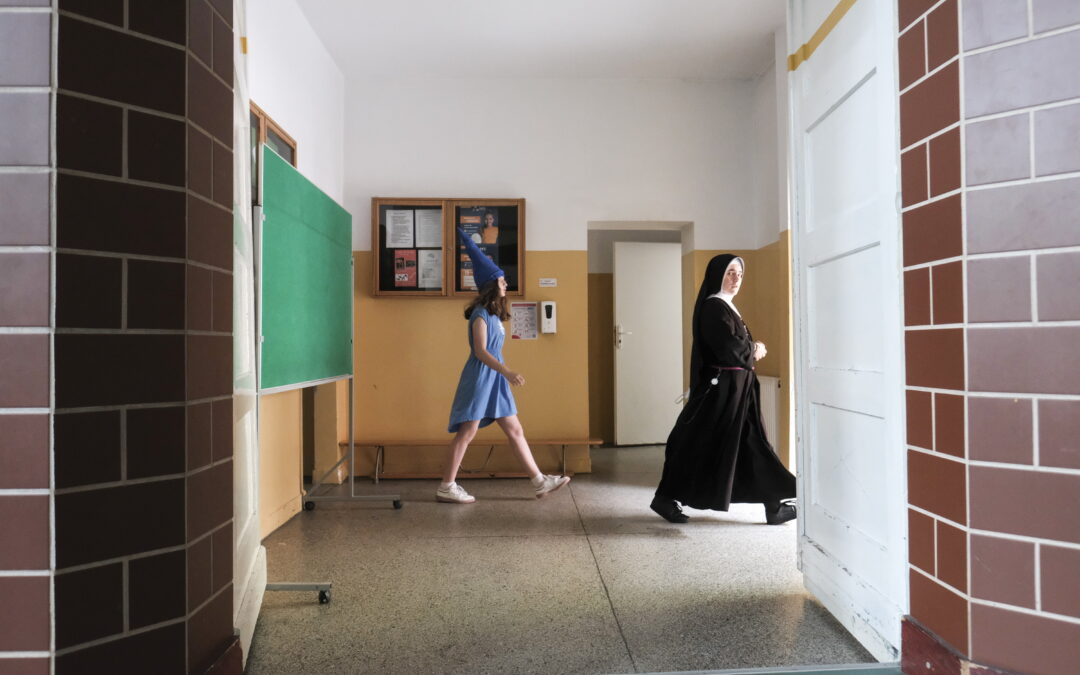The proportion of school pupils in Warsaw attending Catholic catechism classes, which are optional, has continued to fall, the latest figures from municipal authorities show. Among high-school students, the figure is now below 30%.
While Warsaw, Poland’s biggest city, is particularly secular, two senior church figures have over the last week warned that young Poles are increasingly turning against the church, including a growing number leaving it altogether in a “wave of apostasies”.
Warsaw’s education office has since 2019 been collecting data on participation in the lessons, known as religion (religia), which are funded and hosted by the public education system but with teachers and curriculums chosen by the Catholic church.
In 2019, 78% of primary-school children and 44% in high schools attended the classes, reports Gazeta Wyborcza. A year ago those figures had fallen to 72% and 33% respectively, and the latest data shows that they have now reached 67% and 29%.
Even greater declines were recorded in two other types of secondary school – technical and trade schools – where the percentage of pupils attending religion lessons fell from 41% and 52% respectively last year to 23% in both cases this year.
Data from other large cities have shown similar declines. While they are part of a longer-term secular trend, the pace has accelerated in recent years amid revelations of child sex abuse and covers ups in the church as well as anger over the church’s support for an unpopular near-total ban on abortion.
In an interview with Gazeta Wyborcza, Father Rafał Kowalski, spokesman for the curia in Wrocław, Poland’s third-largest city, admitted that the church’s public image is of “an intolerant institution, linked to the ruling camp, with scandals on its conscience, including paedophilia”.
“After the decision of the Constitutional Tribunal [to introduce the near total ban on abortion], we were flooded with a wave of apostasies and resignations from catechesis,” he added. Shortly after that ruling, a poll showed that only 9% of young Poles had a positive view of the church.
Grzegorz Ryś, the archbishop of Łódź, Poland’s fourth-largest city, also told the Polish Press Agency (PAP) that “we are indeed dealing with some kind of wave of apostasy that is rising”.
“If someone leaves the church because they have had a bad experience of it, you cannot tell them that they should have a different one,” said Ryś. “One cannot argue with experience. One can only humbly apologise for that bad experience, and then one must ask oneself: what kind of church are we creating?”
Among those to recently announce they would formally be leaving church was Dawid Podsiadło, one of Poland’s biggest pop stars.
However, the vast majority of Poles continue to identify as Catholics, and the majority of children still attend religion classes. CBOS, a state research agency, found this year that 84% of the population identify themselves as religious believers and 42% say they practise their faith at least once a week.
It found the highest proportion of non-practisers in large cities (37%), among the youngest age group (38%, compared to 13% among the eldest), and people with higher education (22%).
Earlier this year, Wojciech Polak, the archbishop of Gniezno and Primate of Poland, warned that church officials were witnessing a “devastating” decline in religious practice among young people.
Main image credit: Piotr Skornicki/Agencja Gazeta

Alicja Ptak is deputy editor-in-chief of Notes from Poland and a multimedia journalist. She has written for Clean Energy Wire and The Times, and she hosts her own podcast, The Warsaw Wire, on Poland’s economy and energy sector. She previously worked for Reuters.




















